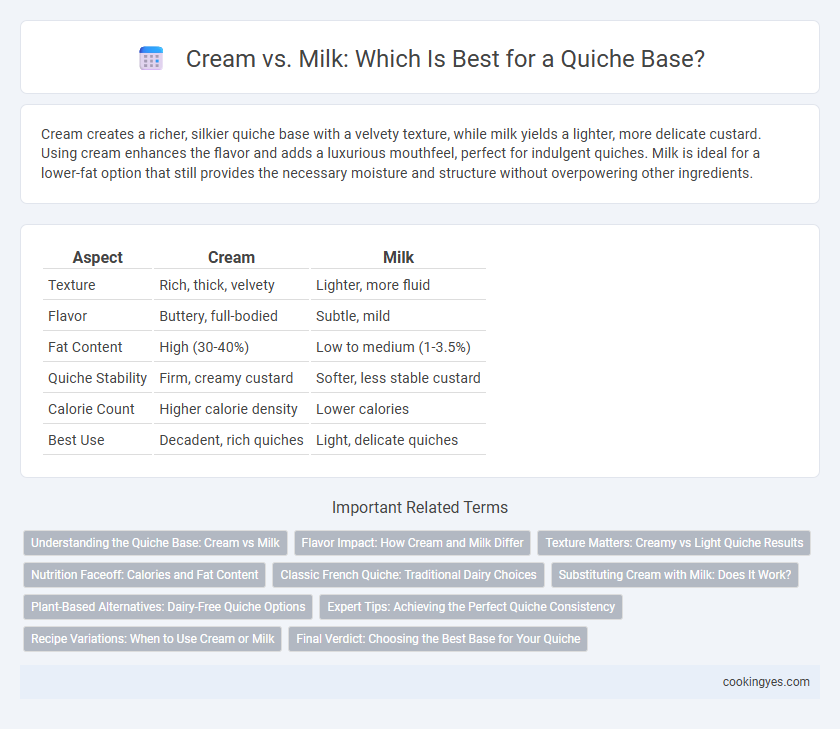Cream creates a richer, silkier quiche base with a velvety texture, while milk yields a lighter, more delicate custard. Using cream enhances the flavor and adds a luxurious mouthfeel, perfect for indulgent quiches. Milk is ideal for a lower-fat option that still provides the necessary moisture and structure without overpowering other ingredients.
Table of Comparison
| Aspect | Cream | Milk |
|---|---|---|
| Texture | Rich, thick, velvety | Lighter, more fluid |
| Flavor | Buttery, full-bodied | Subtle, mild |
| Fat Content | High (30-40%) | Low to medium (1-3.5%) |
| Quiche Stability | Firm, creamy custard | Softer, less stable custard |
| Calorie Count | Higher calorie density | Lower calories |
| Best Use | Decadent, rich quiches | Light, delicate quiches |
Understanding the Quiche Base: Cream vs Milk
Using cream in a quiche base results in a richer, creamier texture and a more custard-like consistency due to its higher fat content, typically around 30-36%. Milk, with lower fat levels (usually 2-4%), produces a lighter, less dense filling that can make the quiche feel less indulgent and slightly more fragile when baked. Choosing between cream and milk directly influences the quiche's moisture, texture, and mouthfeel, with cream offering a luxurious richness and milk providing a subtler, more delicate custard.
Flavor Impact: How Cream and Milk Differ
Cream adds a rich, velvety texture and a pronounced buttery flavor to quiche, intensifying the savory taste and creating a luxurious mouthfeel. Milk produces a lighter custard with a milder flavor, allowing other ingredients like cheese, vegetables, and herbs to stand out more prominently. Using cream results in a denser, richer quiche, while milk yields a subtler, more delicate base that highlights freshness and balance in the overall dish.
Texture Matters: Creamy vs Light Quiche Results
Using cream in a quiche base yields a rich, velvety texture that enhances the overall creaminess and density of the dish. Milk produces a lighter, more delicate quiche with a tender crumb, ideal for those who prefer a less heavy finish. The choice between cream and milk significantly impacts the mouthfeel and richness, influencing the quiche's final consistency.
Nutrition Faceoff: Calories and Fat Content
Using cream in a quiche base significantly increases the calorie and fat content compared to milk, with heavy cream containing approximately 50 calories and 5 grams of fat per tablespoon, whereas whole milk has about 9 calories and 0.5 grams of fat. The higher saturated fat in cream contributes to a richer texture but also raises the quiche's overall fat and calorie density, impacting dietary considerations. Opting for milk reduces caloric intake and fat, making the quiche a lighter, lower-fat option while slightly compromising on the creamy texture.
Classic French Quiche: Traditional Dairy Choices
Classic French quiche relies on a rich, custard-like base achieved by combining heavy cream with whole milk, balancing creaminess and lightness for an ideal texture. Using heavy cream alone creates a denser, more indulgent quiche, while milk alone results in a lighter, less silky custard that may lack depth. Traditional recipes usually favor a ratio of two parts cream to one part milk, enhancing flavor and ensuring a smooth, tender quiche filling.
Substituting Cream with Milk: Does It Work?
Substituting cream with milk in a quiche base significantly reduces richness and alters texture, as cream's higher fat content contributes to a custard-like consistency. Milk provides a lighter, less creamy result, often leading to a firmer and less velvety filling. For optimal quiche texture and flavor, heavy cream or half-and-half remains the preferred choice, but whole milk can be used as a lower-fat alternative with a slightly different mouthfeel.
Plant-Based Alternatives: Dairy-Free Quiche Options
Plant-based alternatives for quiche bases often use creamy coconut milk or almond milk as dairy-free substitutes for traditional cream or milk, providing rich texture and moisture. Silken tofu blended with nutritional yeast creates a smooth, protein-rich base that mimics the custard-like consistency of classic quiche. Cashew cream adds a velvety, neutral-flavored option that enhances the pie's savory ingredients without overpowering the dish.
Expert Tips: Achieving the Perfect Quiche Consistency
Using cream in a quiche base provides a rich, velvety texture and enhances the custard's smoothness, while milk yields a lighter, more delicate consistency. Experts recommend a ratio of two parts cream to one part milk to balance richness without overwhelming the filling ingredients. For optimal results, opt for heavy cream with at least 36% fat content to create a quiche that bakes evenly with a tender, melt-in-your-mouth custard.
Recipe Variations: When to Use Cream or Milk
Using cream in a quiche base results in a richer, custard-like texture with a higher fat content, ideal for decadent recipes or when incorporating dense fillings like cheese and bacon. Milk, being lighter, produces a more delicate and less creamy quiche, preferred for vegetable or lighter breakfast variations to maintain a subtle flavor profile. Selecting cream or milk depends on the desired balance between richness and lightness, with many recipes combining both to optimize texture and flavor.
Final Verdict: Choosing the Best Base for Your Quiche
For the perfect quiche base, cream provides a richer, silkier texture and deepens flavor, ideal for indulgent, custard-like fillings. Milk offers a lighter, more delicate custard, suitable for a subtler taste and lower fat content without compromising structure. Selecting cream or milk ultimately depends on desired richness and calorie preference, with cream favored for luxury and milk for a balanced, lighter quiche.
Cream vs Milk for Quiche Base Infographic

 cookingyes.com
cookingyes.com